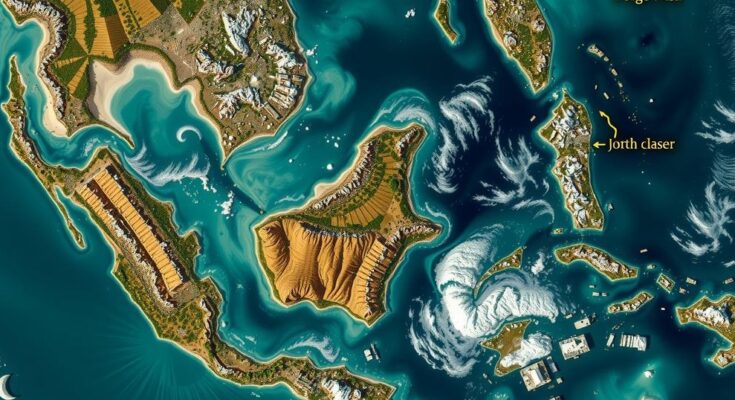Cyclone Chido hit Agalega on December 11, 2024, as a Category-4 storm, causing extensive damage to homes and infrastructure. The cyclone led to residents seeking shelter at the airport. Following its landfall, it also severely affected Mayotte, with reports indicating widespread destruction and a humanitarian crisis due to homelessness and resource shortages.
On December 11, 2024, Cyclone Chido struck the Agalega Islands in the Indian Ocean as a Category-4 equivalent cyclone, achieving sustained wind speeds of 222 km/h (138 mph). This marked the most powerful cyclone to affect Agalega since 1983. The storm caused catastrophic damage, particularly impacting infrastructure, homes, and educational facilities. Residents fled to the airport for safety due to the cyclone’s severe winds and storm surges reaching up to 8 meters (26 feet), which hampered all communication with the islands.
In light of the devastation, Mauritian authorities indicated that aid would be forthcoming, with a Mauritian Coast Guard Dornier aircraft dispatched to assist in relief efforts. Furthermore, an Indian cargo plane was also on its way to support these endeavors. Cyclone Chido continued its destructive path, moving north of Madagascar and on December 14, directly impacting Mayotte, where it unleashed torrential rain, destructive winds of 220 km/h (136 mph), and significant storm surges, inflicting widespread damage.
The aftermath on Mayotte was devastating, with entire neighborhoods flattened and essential infrastructure heavily compromised, including hospitals and transportation facilities. Reports indicate that power and communication systems were disrupted, isolating many residents from help. Initial assessments suggested that approximately one-third of Mayotte’s population of 320,000 may have become homeless, exacerbating difficulties in delivering drinking water and medical supplies to those in need.
As authorities deploy emergency teams, they face challenges accessing certain areas due to blocked roads and flooding. On December 16, concerns mounted regarding a potential rise in the death toll, with many individuals still unaccounted for. The full scope of the destruction and its impact on the community remains a pressing concern.
Tropical Cyclone Chido was a significant weather event that impacted the Agalega Islands and Mayotte, both situated in the Indian Ocean. With wind speeds severe enough to classify it as a Category-4 storm, Cyclone Chido’s impact was exceptionally destructive, particularly for the small population of Agalega. The cyclone not only affected physical landscapes and infrastructure but also disrupted vital communication, highlighting the vulnerabilities faced by island communities in extreme weather scenarios. The subsequent destruction on Mayotte further showcased the dual challenges of natural disaster response and recovery in isolated regions, necessitating international aid and rapid response initiatives.
In summary, Cyclone Chido’s powerful winds and storm surges led to unprecedented damage on the Agalega Islands, marking a critical moment in the region’s history of severe weather. The crisis prompted immediate responses from both local and international authorities seeking to provide assistance, particularly in the wake of further devastation inflicted upon Mayotte. The ongoing assessment of damage and the humanitarian needs of affected populations remain paramount as the situation develops.
Original Source: watchers.news




